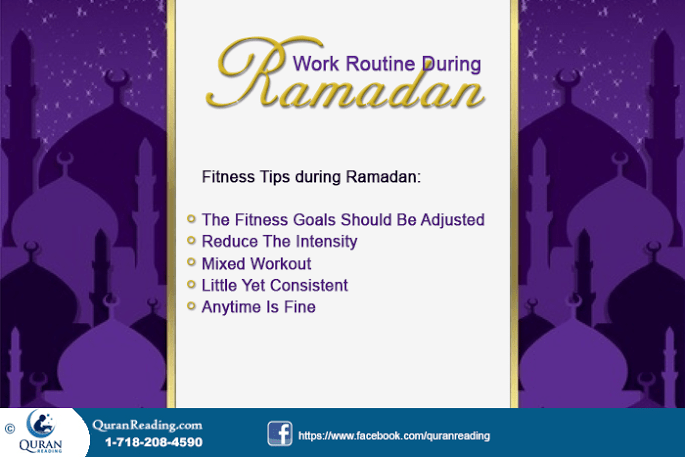
Tips for Workout Routine and Exercise during Ramadan

During the month of Ramadan, Muslims have to change their habits a bit in order to observe the month with proper religious sentiment. In this month, besides avoiding eating and drinking, Muslims also try practicing self-constraint in order to purify their souls. Thus, there is worshiping, the practicing of self constraint, recitation of Quran and refraining from edibles during the Ramadan. Even most Muslims start preparing for Ramadan before the start of the month to reflect the true spirits.

When all this is taken up by Muslims, it is quite natural that they have to make changes in their routine to accommodate all the different things. Besides other things, it is the changes in the meal plan and the consequent health goals that Muslims have to accommodate during the month of Ramadan. With eating only two times a day, at predawn and when breaking fast, the health and fitness goals of a Muslim are surely to be altered and fine tuned.
The lines below give some tips that a Muslim can incorporate in the existing fitness and diet plan to ensure that Ramadan assists in their health and fitness objectives.
The Fitness Goals Should Be Adjusted:
The arrival of Ramadan brings a great change in the daily routine of a Muslim. The health and fitness routine also gets disturbed because in addition to the fast there is the prayer at night, therefore, the time for doing workout pertaining to any fitness goal is hard to manage. Hence, instead of making Ramadan difficult by sticking with the same fitness goal, a Muslim must try adjusting the goals as well. Whether you are on a weight loss diet plan, muscle building regime or general fitness improvement program, your goals should be to maintain your current state in Ramadan, instead of pursuing some intense goal. This way, you are able to stay fit, whilst observing Ramadan in the best possible manner without causing any damage to your health.
Reduce The Intensity:
If you can still find time to perform your regular workout during Ramadan, the thing you need to do is to keep the intensity of the workout low. During Ramadan, the body runs on minimal energy reserves, therefore, trying to perform an intense workout can cause damage to your health and make your fasting experience difficult. If you perform an intense workout after Suhur, then you will deplete all the energy reserves required for you to go through the fast. If you perform an intense workout after before Iftaar, then chances are that you may cause muscle damage, as before Iftaar the body has used up most of the energy reserves and is running very low on energy. If you opt for an intense workout after the Iftaar, then chances are that you might upset your stomach, which will cause problems for you during the night prayer. Therefore, no matter whatever your preferred time of workout is, make sure that you perform the workout in moderate intensity so that neither you make fasting difficult for yourself, nor do you cause any damage to your health.
Recommended Reading – Few Common Mistakes to Avoid in Ramadan
Mixed Workout:
In Ramadan there is all sorts of foods that Muslims consume in Iftaar and in Suhur. In normal days one can resist such foods, however, in the days of Ramadan it becomes difficult to resist such foods. There are foods rich in fats, there are others that are loaded with proteins and carbohydrates. Therefore, the best workout regime recommended for Ramadan is the one that is a mixture of weight training as well as cardio. The cardio exercises will help burn out all the excessive calories you have consumed in the two meals and reduce body fat, whereas, the weight training exercises will help utilize all the protein and carbohydrates in muscle building. Therefore, instead of going for a single targeted workout, in Ramadan, your workout regime should comprise of a mixture of weight training and cardio exercises.
Little Yet Consistent:
The biggest problem with people pertaining to Ramadan is that they leave their normal routine and do nothing, which they used to do during the rest of the year and put all to a pause, even their workout as well. No denying the fact that working out with full intensity during Ramadan is a hard thing to do, however, this does not mean that a person should leave it at all. Rather, one must find time for workout, no matter how little and keep on doing it on regular bases. Although it wont produce the same effects as it does in regular days, however, the least it can do is to keep you fit, if not progress in your health and fitness goal.
Anytime Is Fine:
The thing with fasting in Ramadan is that there are days when even during the fast a person feels full with energy, while there are days when despite the best eating during Suhur a person feels down and low, therefore, assigning a fix time to work out is perhaps not a good ploy in Ramadan. Instead, what you as a Muslim must do during the month of Ramadan is listen to your body and whenever it is ready for a workout you should go for it and perform a moderate workout. Therefore, instead of forcing your body for a workout regardless of the signals it is sending to your brain, you must listen to it during Ramadan and perform workout whenever your body feels like doing so.
Workout Plan
While fasting, it is important that you reduce your cardio exercises to 2 days every week. This is an important step to save as much lean muscle mass as possible. Some other workout tips during Ramadan are given below.
- Avoid weight training while fasting. This may result in too much muscle breakdown.
- Training while dehydrated reduces the strength to carry on with the rest of the day. Studies show that a 3% dehydration of the muscle results in 12% or more loss in the stamina.
- Weight train after the Taraweeh prayers. This way, you can ensure that you have consumed enough food and water or your favorite shake essential for muscle growth to stay energetic while working out in the gym.
- Cardio exercises should be done before Suhoor. Make sure you consume plenty of water and some coffee or tea before your cardio exercise. It is best to wait around 30 minutes before performing a moderate intensity cardio exercise.
Conclusion:
In a nutshell, it is an evident fact that the arrival of Ramadan and its observance requires a change in normal routine of a Muslim. The arrival of Ramadan does not mean that a Muslim must leave the workout and give up the health and fitness regime; rather, he or she must try on performing workout as much as possible, so that fitness and health do not get out of hand by the end of Ramadan.




